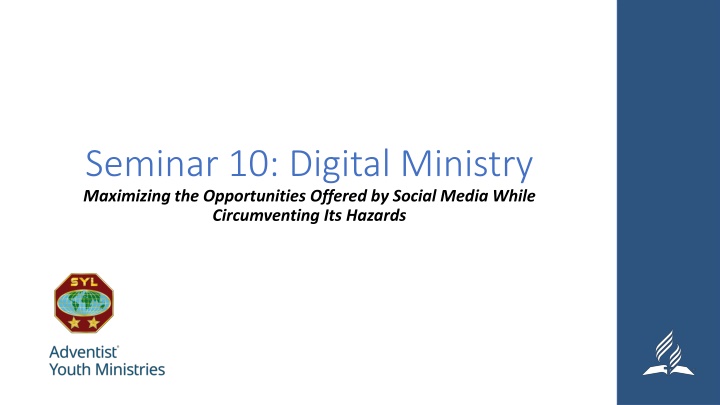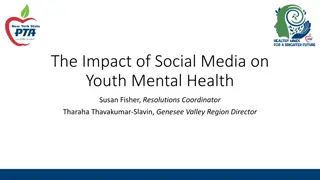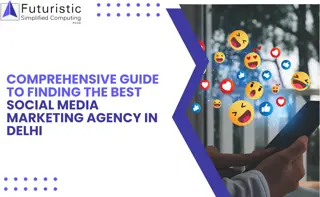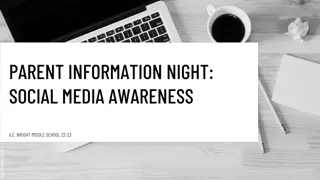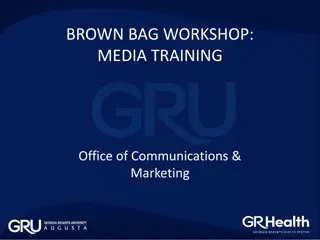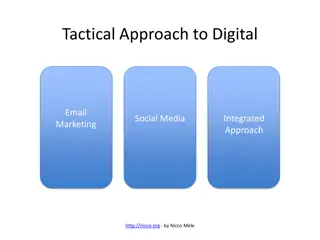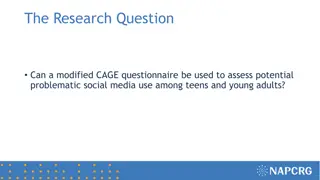Navigating the Digital Landscape: Youth and Social Media Challenges
The seminar delves into the impact of social media and technology on youth, emphasizing the need for guidance to leverage its benefits while mitigating risks. With a focus on internet and cell phone usage, it offers insights from biblical teachings for counseling and supporting young individuals in managing these influences. Alarming statistics reveal the extent of media consumption and associated challenges, highlighting the necessity for proactive engagement in this digital era.
Download Presentation

Please find below an Image/Link to download the presentation.
The content on the website is provided AS IS for your information and personal use only. It may not be sold, licensed, or shared on other websites without obtaining consent from the author.If you encounter any issues during the download, it is possible that the publisher has removed the file from their server.
You are allowed to download the files provided on this website for personal or commercial use, subject to the condition that they are used lawfully. All files are the property of their respective owners.
The content on the website is provided AS IS for your information and personal use only. It may not be sold, licensed, or shared on other websites without obtaining consent from the author.
E N D
Presentation Transcript
Seminar 10: Digital Ministry Maximizing the Opportunities Offered by Social Media While Circumventing Its Hazards
INTRODUCTION INTRODUCTION The first language of many of youth is not French, Portuguese, Tswana, Swahili or English, it s social media. Traditionally, friendships have been personal, but since the advent of social media, they have, to a great extent, become digital instead. We cannot ignore the power and influence of social media on our youth, but we need to educate them on both the opportunities and the dangers. The leader should help the youth to be stewards of social media.
2 2- -SEMINAR OBJECTIVES SEMINAR OBJECTIVES In this seminar we will study how the internet, social media, and cell phone usage affects youth and their world. We will look into the Bible and our church teachings to find insights on how to provide counsel, leadership, and assistance to young people in dealing with these issues.
Internet/Social Media Internet/Social Media
3 3- -WHATS THE PROBLEM? WHAT S THE PROBLEM? The internet is an incredible marvel of technology. And like most marvels of technology, it has incredible potential for good, and for evil. Do you have any bad experiences? Heard of bad experiences? Please Share But the web is not only about computers. It s about people, media, and choices and those are all important issues for any Christian. We can choose to use email to keep in touch with friends, do research for school or work projects, check out and support our favorite Christian music artists, and discuss hobbies, not to mention spiritual subjects with people around the whole world. The web has a great potential for good.
Alarming Statistics (USA) Today s teens spend more than 7 hours a day consuming media watching TV, listening to music, surfing the Web, social networking, and playing video games. 93% of teens ages 12 17 go online 38% of teens ages 12-17 send text messages daily, while a quarter send daily messages via social networks. One in every 25 teens had "problematic Internet use" and those students also tended to be more depressed and would get into serious fights more often. And boys in that category had higher rates of smoking and drug use.
Cell Phones Cell Phones The average cell phone user has more computing power in their palm than what it took to land men on the moon in 1969 technology really has come a long way. Cell phones are a true blessing; allowing us opportunities to multi-task and work smarter, not harder, and to access information at lightning-fast speed; or contact someone quickly and efficiently in case of an emergency; or share the love of Jesus through a verse, testimony, poem, etc. Plus, we can choose from virtually any type of game, app, or entertainment we desire But as with anything that offers us blessings, there are curses in disguise and with the incredible power that cell phones give youth, great responsibility and caution must be exercised in how they are used.
4 4- -FINDING SOLUTIONS FINDING SOLUTIONS We must help our youth understand that technology isneither some scary, evil plot to destroy their minds and souls, nor is it the heaven-sent answer to all of earth s problems. It s just a tool, and it can be used for good or evil. Like everything else in life, it comes down to the choices we make. As we have studied throughout this seminar, a very important part of our leadership is to model good social media choices in our own lives. If we re not, it won t matter what we tell them.
Some Things Your Young People Need to Know Some Things Your Young People Need to Know Anyone can put up a website, so it s our responsibility to make sure that the information we re getting is coming from a reliable source. Teach youth to compare different, reliable sources before believing everything they read. Using the Web for entertainment is just as legitimate as picking up a book, turning on the TV, or putting a CD in the stereo. And we need to follow the same guidelines. Would Jesus cheerfully watch/listen to this with you? Always follow safety rules
Rules for Social Media Safety Rules for Social Media Safety 1. Never give out your real name, address or phone number. Unless you already know them personally, keep your online friendships online; don t plan to meet in real life. Be careful about giving any identifying information like your hometown, the name of your school, the name of a team you play on etc., that might allow a stalker to identify you. You can share what s going on in your life with online friends without having to give a lot of details. 2. Never abuse; make fun of, or bully someone online! Not only is this behavior inappropriate in all social media environments, but it is also against the law and downright ungodly! Jesus made it clear that we should always seek to treat others the way that we would want to be treated ourselves (Matt. 7:12).
3. Set reasonable personal time limits. The apostle Paul had this to say about doing things even good things too much: You say, I am allowed to do anything but not everything is good for you. You say, I am allowed to do anything but not everything is beneficial (1 Corinthians 10:23, NLT). The reality is that most youth s online time will be spent on social media; so, limit yourself and if you have a problem with that
Rules for Social Media Safety Rules for Social Media Safety 4. Walk with the wise. Solomon in Proverbs 13:20 writes, Walk with the wise and become wise, for a companion of fools suffers harm (NIV). If you ve got friends who are choosing to use the internet unwisely then it s likely that you ll also fall prey to the negative peer pressure. Choose your friends wisely. They will either help you or hurt you. 5. Make yourself accountable to a caring adult. Talk to a parent, teacher, youth pastor, Pathfinder leader or counselor. Any adult who cares about you will be more than happy to help you find a balance in your life when it comes to social media.
5 5- -SOCIAL MEDIA ADDICTION SOCIAL MEDIA ADDICTION For many youth the internet and social media are great ways to access information, get entertainment, and stay connected with friends and family, but for some a surprisingly large number the internet can actually become an addiction.
Warning Signs of Addiction Warning Signs of Addiction Diminished interest in activities youth once enjoyed Feelings of distress or anxiousness when youth cannot use the Internet sSecretive Internet usage Withdrawal from activities with family and friends
6 6- -WHAT THE BIBLE SAYS WHAT THE BIBLE SAYS Whatever is true, whatever is noble, whatever is right, whatever is pure, whatever is lovely, whatever is admirable--if anything is excellent or praiseworthy--think about such things (Philippians 4:8, NIV).
What The Bible Says What The Bible Says God wants our youth to Flee the evil desires of youth and pursue righteousness, faith, love and peace, along with those who call on the Lord out of a pure heart (2 Timothy 2:22, NIV). Some may need to give themselves an internet/social media vacation until they get their priorities straightened out. Moses, in Psalm 90:12 wisely writes: Teach us to number our days, that we may gain a heart of wisdom (NIV).
What The Bible Says What The Bible Says Many youth fall prey to the devil s trap when it comes to the choices they make online, but God says: Don t copy the behavior and customs of this world, but let God transform you into a new person by changing the way you think. Then you will learn to know God s will for you, which is good and pleasing and perfect (Romans 12:2 NLT). The thing that may help the most is simply remembering that our minds and bodies belong to God and are a holy place where He lives (1 Cor. 6:19-20). Create some activities which help to reinforce this, and it will tend to chase away all unhealthy obsessions, online or not.
7 7- -WHAT THE CHURCH SAYS WHAT THE CHURCH SAYS God calls us to live in light of His grace, knowing the infinite cost God paid to save us. Through the Holy Spirit we glorify God in our minds, bodies and spirits. We are called to be a godly people who think, feel and act in harmony with the principles of heaven. For the Holy Spirit to recreate in us the character of our Lord we should involve ourselves only in those things which will produce Christ-like purity, health and joy in our lives. This means that our amusement and entertainment should meet the highest standards of Christian taste and beauty. . . It also means that because our bodies are the temples of the Holy Spirit, we are to care for them intelligently. Along with adequate exercise and rest, we are to . . . engage in whatever brings our thoughts and bodies into the discipline of Christ, who desires our wholesomeness, joy and goodness. (Rom. 12:1, 2; 1 John 2:6; Eph. 5:1-21; Phil. 4:8; 2 Cor. 10:5; 6:14-7:1; 1 Peter 3:1-4; 1 Cor. 6:19, 20; 10:31; Lev. 11:1-47; 3 John 2.)
8 8- -PRACTICAL GUIDELINES PRACTICAL GUIDELINES It is important to understand the key difference between the internet and social media. The internet is a kind of super-highway, and social media things like Facebook, SnapChat, Twitter, YouTube, Vine, Tumblr, Medium, Kik, and Instagram are all different side-roads that can be used on that superhighway. As we have studied, we can help our youth make wise choices about which apps to use and how to use them by filtering all choices through God and His Word, the Bible. It is fine for them to use the web to stay in contact with friends and family who are miles away. Whether they send letters by email, arrange to meet in a (private) chatroom, or post family pictures on a website for grandma to view, they can use the web to strengthen the relationships they already have.
Practical Guidelines Practical Guidelines But what s much more intriguing and controversial is using the web to make new friendships. There are lots of ways to do this. One of the most common is through chatrooms where people meet to talk about common interests. Chatrooms range from places where Christians meet for online Bible studies, to places where people gather to discuss downright perverted topics. Young people are naturally curious, and on top of that, being invisible online can lead to a feeling of deceptive power and safety. They will take chances they might not in real life. They must learn to exercise choice and discretion in deciding where to chat and with whom. People also meet online through message boards and news groups, where one can post a message on a topic that interests one and check back later to see if anyone s answered the post. Here is where the safety rules above especially apply.
Practical Guidelines Practical Guidelines Chatrooms, message boards, and newsgroups can all begin to take on a sense of community as the same people use them over and over and get to know each other. People can either post questions and information by typing, but they can also connect via face-to-face as well with things like Google Hangouts, Skype, Facebook, and FaceTime. As is to be expected, online friendships (and romances/infatuations) do form. Someone can go from discussing a hobby they re interested in, to sharing concerns and problems from their everyday lives, and even (on many Christian sites) asking for prayer and encouragement from fellow believers. This sense of community of knowing and being known can be great. It can also be deceptively dangerous. Remind your young people: Online friendships can be wonderful. But they come with a major warning attached: generally, you don t actually see these people. You don t know anything about them, except what they choose to reveal on their computers.
Practical Guidelines Practical Guidelines Always be cautious with people you chat with online. Remember, somebody in your chatroom may not be who they say they are. It s sad, but true, that there are sick people out there who lurk in youth chatrooms looking for young people of whom they can take advantage of: hurt, abuse, kidnap, rape, or even murder! Does this mean they should never chat, post messages, or otherwise get acquainted with people online? No, it simply means they must remain watchful and follow the safety rules. One great safety is the same as it is in everyday, personal life: trusted adults.
Practical Guidelines Practical Guidelines Remind your youth that in the same way that parents (or other trusted adults) would like to meet and know the friends they bring over to the house, so they should be invited to meet online friends. If you have modeled good, compassionate, caring, and open leadership qualities for them, they will be more likely to believe that you might know something more than they do about who is to be trusted online. Of course, you know that not all your young people have trustworthy parents, and some have parents they could, in fact, trust, but for whatever reason, they don t. They need to be able to turn to you for guidance.
More Suggestions, from Psychologist, Speaker More Suggestions, from Psychologist, Speaker and Popular Author, Dr. Tim Elmore: and Popular Author, Dr. Tim Elmore: Teach your young people to balance screen time with face time. For every hour they spend in front of a screen, they should spend equal hours face to face with people. This will help them keep their soft skills high as they enter a job. Place your kids in groups and ask them two questions to prompt discussion: What are the advantages to new technology in our lives? What are the disadvantages to new technology in our lives? When spending time in face-to-face conversations, always prioritize those people. Place your phone on silent and give eye contact with the persons in front of you. This communicates they are the priority and that you can reply to messages later.
Dr. Tim Elmores Suggestions Dr. Tim Elmore s Suggestions Give assignments that force young people to interface with people from older or younger generations. Whenever we converse with those different from us we grow in our emotional intelligence and in our communication skills. Teach your students that whenever they feel they re slipping into a dependence or addiction to anything it always helps to take time off. Together, you and they can do a technology fast and put your phones, tablets or laptops away for a season. You ll all feel liberated. Encourage parents to talk to their children about these issues at least before middle school. They should monitor their kids cell phone and Facebook page, as long as they still live at home.
Dr. Tim Elmores Suggestions Dr. Tim Elmore s Suggestions Talk about it so it s not a secret, but remind them accountability is good, and prevents harm. Let them see your pages, too, to help them see that you, too, follow good internet safety rules. Work with schools to communicate that sexting is illegal/immoral. Teen sexting leads to criminal charges; and when photos get sent to another state it s a federal offense. Teach Social Etiquette with Cell Phones (see Additional Resources for link) Teach them that choices have consequences Teach them to think before they act Teach them that what s posted online, stays online forever!
9 9- -ACTIVITIES ACTIVITIES Discuss: Because of the dangers, some parents are hesitant to grant internet privileges to their teens. Others allow their teens total freedom to surf the net as they please. How much freedom or restraint do you think teens should be allowed on the internet? List at least four internet safety rules. Read 1 Corinthians 9:19-23 and discuss: what are some ways a Christian youth could use the internet and social media to help spread the gospel? How can social media be incorporated in Youth Ministry?
10 10- -CONCLUSION CONCLUSION Youth today use technology as a natural part of their life. They have been born into and grown up in a world that is infused with it. Cell phones, the internet and social media can either be an incredible help or hindrance to them. It s all in how you, as their youth leader, have prepared yourself to train them and their parents about both the positive and negative aspects of it. Be sure to ride on the positive outcomes of social media.
Handout Materials Handout Materials The internet, social media, and cell phones can be incredible blessings, but they can also quickly become a real curse if not used carefully and with balance. DO NOT ALLOW technology to make you roadkill on the Information Superhighway. If you feel like you have a problem: 1. Take the Internet Addiction Test (Check SYL Manual under this topic). 2. Confess your dependence/addiction to God and ask for His forgiveness and for strength to stop it. 3. Immediately ask a parent/guardian for help. 4. Get treatment at a hospital if you need to. Commit to following through with the help. 5. Once you re better, purposely ask a trusted adult for accountability. 6. Check in regularly with your accountability partner to keep you safe and free from getting addicted again.
